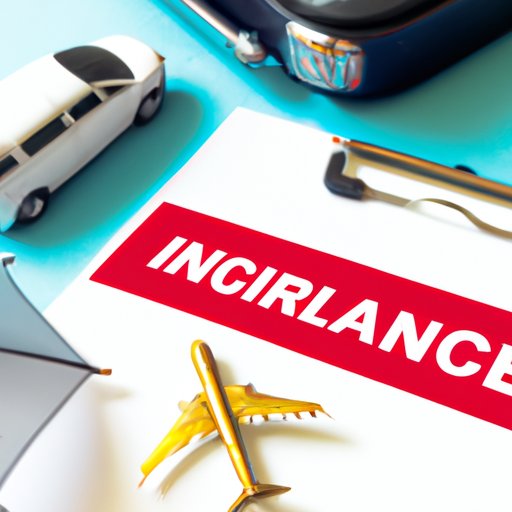Introduction
Travel insurance is a type of insurance that covers unexpected losses or damages incurred while traveling. It can provide protection against a variety of risks, such as flight delays, lost luggage, medical emergencies, and more. Knowing when your travel insurance starts can help you determine if it’s the right choice for your trip.
Explaining the Different Types of Travel Insurance and When They Start
Travel insurance comes in many forms and can offer different levels of coverage depending on the type of policy you purchase. The most common types of travel insurance include:
Trip Cancellation/Interruption Insurance
Trip cancellation/interruption insurance provides coverage for losses due to an unexpected event that forces you to cancel or interrupt your trip. This type of insurance typically starts at the time you purchase the policy and covers any pre-paid, non-refundable expenses up to the amount specified in the policy.
Medical and Emergency Evacuation Insurance
Medical and emergency evacuation insurance provides coverage for medical expenses incurred while traveling, as well as the cost of evacuating you from a remote location due to a medical emergency. This type of insurance typically begins when you depart on your trip and ends when you return home.
Baggage Insurance
Baggage insurance provides coverage for the loss or damage of personal items while traveling. This type of insurance typically begins when you leave your home and ends when you return home.
Accident and Sickness Insurance
Accident and sickness insurance provides coverage for medical expenses incurred while traveling, as well as any additional costs associated with a medical emergency. This type of insurance typically begins when you leave your home and ends when you return home.
When Coverage Begins
The timing of when your coverage begins depends on the type of policy you purchase. Generally, most policies will begin when you depart on your trip and end when you return home. However, some policies may begin earlier, such as trip cancellation/interruption insurance, which typically starts at the time you purchase the policy.

Reasons to Purchase Travel Insurance Before You Leave
Travel insurance provides financial protection and peace of mind when traveling. It can cover unexpected expenses and losses due to unforeseen circumstances, such as a medical emergency, flight delay, or lost luggage. Purchasing travel insurance before you depart can help you feel more secure during your trip.

How to Choose the Best Travel Insurance for Your Trip
When choosing a travel insurance policy, it’s important to consider your destination and the activities you plan to do while there. You should also review the exclusions of the policy to make sure you understand what is not covered. Additionally, it’s important to compare prices and make sure you are getting the best value for your money.

Providing an Overview of Common Exclusions in Travel Insurance Policies
Most travel insurance policies have a list of exclusions that are not covered by the policy. Some of the most common exclusions include pre-existing conditions, high-risk activities, and unforeseen events. It’s important to read through your policy carefully to make sure you understand what is and isn’t covered.
The Benefits of Buying a Travel Insurance Policy in Advance
Buying a travel insurance policy in advance can help you save money and provide coverage for unexpected circumstances. A policy purchased in advance can often be cheaper than one purchased at the last minute. Additionally, if something unexpected happens while you are away, you will already have coverage in place.

Dissecting a Typical Travel Insurance Policy to Explain When Coverage Begins
To better understand when coverage begins, it’s important to review the details of a typical travel insurance policy. Most policies will state when coverage begins and ends, as well as what is covered and excluded from the policy. Knowing this information can help you determine when your coverage begins and if you need to purchase additional coverage.
Comparing the Costs of Travel Insurance with the Potential Savings from Having it
It’s important to calculate the cost of insurance compared to the potential savings from having it. For example, if you are traveling overseas and the cost of medical care is expensive, purchasing travel insurance could save you thousands of dollars in the event of an emergency. On the other hand, if the cost of medical care is relatively inexpensive, you may decide that the cost of insurance is not worth the potential savings.
Conclusion
Travel insurance is an important part of any trip. Knowing when your coverage begins and understanding the different types of travel insurance available can help you make an informed decision about the right policy for your needs. Additionally, comparing the cost of travel insurance with the potential savings from having it can help you determine if it’s the right choice for you. By following these guidelines, you can ensure that you are properly protected while traveling.
(Note: Is this article not meeting your expectations? Do you have knowledge or insights to share? Unlock new opportunities and expand your reach by joining our authors team. Click Registration to join us and share your expertise with our readers.)
